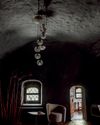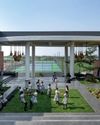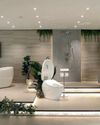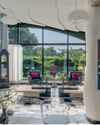
There is an undeniable, inherent connection that humans have with nature as they seek calmness and peace at the sight and sounds of nature. Nature and its many grand, beautiful offerings have been associated with a decrease in the body’s sympathetic response, and an increase in parasympathetic response, which helps the body relax and function in normal circumstances, commonly known as the ‘rest-digest’ response.
Edward Osborne Wilson (1929–2021), University Research Professor Emeritus at Harvard, in 1984 published ‘Biophilia’ which explored the evolutionary and psychological basis of humanity’s attraction to the natural environment. This work introduced the word biophilia into the language, and has been influential in the shaping of the modern conservation ethic. An innate and genetically determined affinity of human beings with the natural world, Biophilia seems like a very obvious concept.
A few fundamental elements of Biophilic design are incorporation of environmental elements, natural shapes and forms in architecture and landscaping, natural patterns and processes that provide a multi-sensory experience, abundance of natural light and open spaces. These could be implemented with the simplest of actions from addition of plants and other natural features into manmade settings to express a love for nature, right up to the extent of incorporating this into the very core of a building design. Smartly designing buildings to let more natural light in, constructing facades which reflect heat and keep the insides cool, parks and open spaces which embody the spirit of green-scapes and forests, all add up to a more delightful, joyous living experience.
This story is from the {{IssueName}} edition of {{MagazineName}}.
Start your 7-day Magzter GOLD free trial to access thousands of curated premium stories, and 9,000+ magazines and newspapers.
Already a subscriber ? Sign In
This story is from the {{IssueName}} edition of {{MagazineName}}.
Start your 7-day Magzter GOLD free trial to access thousands of curated premium stories, and 9,000+ magazines and newspapers.
Already a subscriber? Sign In

ALL THINGS DESIGN
Design Debate had its yet another memorable edition in the heart of South

Wise & Wild
A delectable design that emerges from a creative powerhouse that answers a question with a question. Read on to discover the bold and captivating design of Sorbet by MuseLAB for Aquant.

REVITALISING HISTORY
The transformation of the Chambers of Khamovnaya Sloboda into a beautiful cultural project is indeed awe-inspiring.

DESIGNING FOR LEARNING
The Basil Woods International School, Hyderabad, designed by Architecture Dialogue is a beautiful example of how design can address the challenges of a site.

THE BATH WAY
New age sanitaryware is all things innovative, design forward, hygienic, and comfortable to make bathrooms functional as well as aesthetic.

BREATHING LIFE
Studio Swatp transforms a historic Alibaug wada into a vibrant holiday retreat.

KNOCKOUT KITCHENS
The kitchen continues to be the heart of modern living spaces, with trends emphasising a seamless blend of innovation, functionality, and aesthetics.

The ROYAL DEN
Harkaran Singh Boparai, Founder and Principal Architect, Harkaran Boparai Studio (HBS), takes us through his regal atelier in the heart of Delhi and the journey that led to it.

SCULPTING FLUIDITY
The architecture of The Liquescent House by Shaili Banker Architects displays a language of organic fluidity.

DESIGN DEBATE NEW IDEAS SET SAIL IN SCENIC GOA
Replete with Portuguese vibes and picturesque sites, the October Edition of the Design Debate held in Goa was an exceptionally intriguing one.